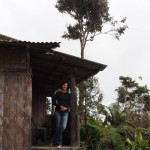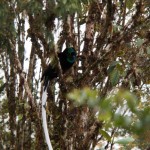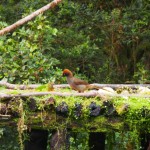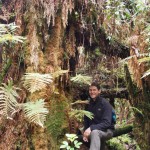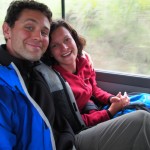Ahhh, Kumul Lodge. So right in many ways; so frustrating in so many others. It’s like PNG in miniature.
We headed there just after the Mt Hagen show – as you can imagine, we were still on a bit of a high after that. We’d plumped for Kumul as our destination as the alternative, Tari, sounded potentially a little far to travel and a little dangerous (rumours of an ongoing tribal war), and Kumul sounded nice – lots of birds of paradise, great hiking including to some local villages and a beautiful location not far from Mt Hagen. All of which was true.
Well, sort of. And there’s the rub.
There were birds of paradise – 8 species in fact. It’s just that only one species lives at the same altitude as the lodge, and for the others you need to take a tour to see them. Cost: $150 per person. There was hiking available – but only really along the road and a few short trails around the hotel; the other trails were never used, not really maintained and virtually un-passable (we tried: see “Mt Hagen Running Man”) and of course you needed to take a guide. The closest village was actually 10 kilometres and over 1,000 vertical metres away from the hotel – only walkable if the lodge provided a one way car transfer – and they didn’t have a car (we managed it by hitching a ride – with some other tourists one way and in a truck on the way back). Food was available – unless you were late or they forgot about you (both happened) – including a complimentary plate of fruit. Only it wasn’t complimentary, it was an additional $10 per mealtime.
Just enough minor annoyances to really take the shine off what should have been a great place – yes it was beautiful, yes the bungalow was lovely and rustic, and YES we saw birds of paradise. We both just ended up wildly frustrated by the place.
And yet, in some ways, we talk more about Kumul than we do about many of the more spectacular places we saw in PNG. We think that maybe in some ways, it provided a truer vision of the country than almost anywhere else we stayed.
A few vignettes:
The village down the road was abandoned and burned down. There had been a land dispute between villagers which escalated and ultimately culminated in some shootings. The entire village took sides, and war kicked off. Ultimately, the place became so dangerous that every single family abandoned both the village and their ancestral land (and only source of income) to stay with relatives. A man from Hagen was hired by one side to burn down the remaining houses – the other side found him and killed him. Negotiations were currently taking place as to appropriate reparations – in the form of live pigs to be transferred, and only once this had been agreed would any of the villagers be able to return home. This wasn’t considered at all unusual locally, other than the fact that the dispute was within just one village, rather than the usual two.
Our guide, Max, was a born naturalist with a burning ambition to start up his own eco-tourism business centred around an orchid garden. Only he couldn’t get any backing. Partially because under the PNG “wantok” system, he owed his loyalty to one of his relatives, the owner of Kumul Lodge – who preferred that Max spend his time guiding tourists and maintaining the grounds of the lodge. Partially because Max was wildly unrealistic – I’ve never met a man so bitter about the refusal of local people to work for him on the promise of future payment as and when the orchid garden took off. Partially because the whole idea is so flawed – who’s going to come to see a 40 foot square orchid garden, however nice, when it’s miles from anywhere and smack in the middle of Max’s sweet potato crop? But how do you work that out when you live in a country with minimal education and a staggering 75% unemployment?
We asked for the bill on our last day and were a little surprised when it took 20 minutes to produce. And then it was wrong. The reception lady simply couldn’t add. I’m not being unkind when I say that, rather it’s a simple statement of fact. Up until about 50 years ago, the PNG counting system consisted of 1, 2, 3, many. Given the relatively limited amount of cash trading, that system still works pretty well for much of the population and the basic numeracy skills that we take for granted are just not that widespread. Most adults over the age of 30 probably weren’t taught much (any?) maths and can’t do even basic sums without the aid of a calculator.
Our airport transfer, which we carefully arranged with the lodge manager the evening before. They forgot about it. We managed to make the plane, but only because they were able to speak to one of their wantoks down at the airport and get us ticketed (we arrived 10 minutes before the flight took off).
I could go on, but I won’t.
Suffice to say that Kumul, like PNG, got under our skin. I wouldn’t have missed it for the world.
- Beautiful Kumul Lodge
- Yes! A real bird of paradise!
- Some other rare bird whose name I have temporarily misplaced
- Great trails – just as long as you don’t want to go too far
- We hitch a ride with an over-50s group of tourists – CRAAAZZYYY!

